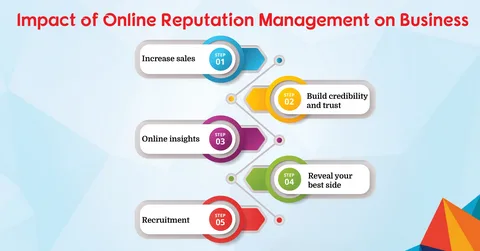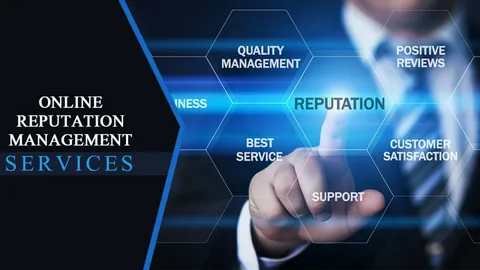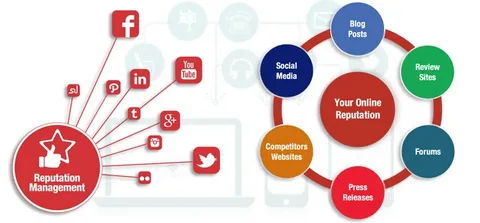In today’s highly competitive digital landscape, maintaining a strong online image is crucial for businesses of all sizes. The internet has given customers the power to share their experiences and opinions widely, influencing the perceptions of potential clients. A single negative review or damaging comment can have a significant impact on your brand’s reputation. This is where reputation management plays a vital role. By proactively managing and enhancing your online image, you can stay ahead of the game and cultivate a positive brand perception. In this article, we will explore the importance of reputation management and how it can empower your business to thrive in the digital world.
The Power of Reputation Management
Building Trust and Credibility
A strong online reputation is the foundation of building trust and credibility among your target audience. When customers search for your business online, they rely on the information they find to form an opinion. Reputation management allows you to shape that opinion by ensuring that positive content and reviews dominate search results. By actively managing your online image, you establish trust and credibility, which are crucial for attracting and retaining customers.
Influencing Customer Perception
Reputation management empowers you to influence how customers perceive your brand. By strategically crafting your online presence, you can shape the narrative surrounding your business. Positive customer reviews, engaging social media content, and thought leadership articles can all contribute to a positive brand perception. Reputation management helps you curate and amplify these positive elements, ensuring that potential customers see your business in the best possible light.
Strategies for Enhancing Your Online Image
Online Brand Monitoring
One of the fundamental pillars of reputation management is monitoring your online brand presence. By employing cutting-edge tools and technologies, reputation management services keep a close eye on social media platforms, review websites, and online mentions. This proactive approach allows you to quickly identify and address any negative comments or reviews. By promptly addressing customer concerns and resolving issues, you can demonstrate your commitment to customer satisfaction and protect your brand’s reputation.
Strategic Content Creation and Distribution
Creating and distributing strategic content is key to enhancing your online image. Reputation management services can help you develop a content strategy that aligns with your brand values and resonates with your target audience. Engaging blog posts, informative videos, and captivating social media content all contribute to a positive online image. By consistently producing valuable content and distributing it across relevant platforms, you can establish yourself as an industry leader and enhance your brand’s reputation.
Building a Positive Online Review Profile
Online reviews have a significant impact on customer purchasing decisions. Reputation management services can guide you in proactively managing and building a positive online review profile. This includes encouraging satisfied customers to leave reviews and promptly addressing any negative feedback. By actively engaging with your customers and nurturing positive relationships, you can generate a wealth of positive reviews that reinforce your brand’s reputation and influence potential customers.
Proactive Crisis Management
Preparing for potential crises is essential in safeguarding your online image. Reputation management services can help you develop a proactive crisis management plan that outlines the steps to be taken in times of adversity. By having a well-defined strategy in place, you can respond swiftly and effectively, minimizing the impact on your reputation. Proactive crisis management demonstrates your ability to handle challenging situations, instilling confidence in your brand among customers and stakeholders.
Conclusion
In today’s digital world, a positive online image is paramount to the success of any business. Reputation management enables you to stay ahead of the game by actively managing and enhancing your brand’s online reputation. By building trust and credibility, influencing customer perception, and employing strategies such as online brand monitoring, strategic content creation and distribution, building a positive online review profile, and proactive crisis management, you can cultivate a strong online image that sets you apart
from the competition.
Investing in reputation management is an investment in the long-term success of your business. By staying proactive and vigilant in managing your online image, you can effectively respond to customer feedback, address concerns, and build a strong brand reputation. A positive online image not only attracts new customers but also fosters loyalty among existing ones.
Partnering with a reputable reputation management service provider can provide you with the expertise and resources needed to navigate the complexities of online reputation management. These professionals have the knowledge and tools to monitor your brand’s online presence, create compelling content, manage reviews, and handle crises effectively. By leveraging their experience, you can streamline your reputation management efforts and focus on growing your business.
In conclusion, staying ahead of the game in the digital world requires a proactive approach to reputation management. Enhancing your online image through strategies such as online brand monitoring, strategic content creation and distribution, building a positive online review profile, and proactive crisis management is key to establishing trust, credibility, and influence among your target audience. Embrace the power of reputation management and position your business for success in the competitive digital landscape.










